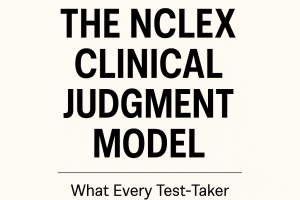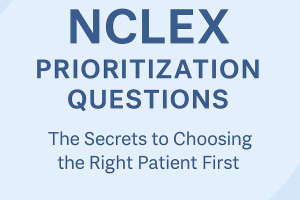The Most In-Demand Nursing Specialties for 2025

The nursing field is constantly evolving, with new challenges, technologies, and healthcare demands shaping the industry. As we move into 2025, certain nursing specialties are becoming more critical due to aging populations, advancements in medical treatments, and shifts in healthcare policies.
If you are preparing for the NCLEX or planning your nursing career, understanding which specialties are in high demand can help you make informed decisions. In this post, we explore the most in-demand nursing specialties for 2025 and why they are essential.
1. Nurse Practitioners (NPs)
Why it is in demand:
With a growing shortage of primary care physicians, nurse practitioners are stepping in to fill critical gaps in patient care. Many states are expanding full practice authority for NPs, allowing them to work independently without physician oversight.
Key areas of demand:
- Family Nurse Practitioners (FNPs) – Providing primary care across all ages
- Acute Care Nurse Practitioners (ACNPs) – Managing critically ill patients
- Psychiatric Mental Health Nurse Practitioners (PMHNPs) – Addressing the growing mental health crisis
NCLEX Tip: Nurse practitioners need a strong foundation in advanced pathophysiology, pharmacology, and clinical assessment.
2. Critical Care Nurses (ICU Nurses)
Why it is in demand:
The COVID-19 pandemic highlighted the need for skilled ICU nurses, and the demand remains high as hospitals manage increasing cases of chronic illnesses and post-pandemic complications.
Key responsibilities:
- Caring for patients with life-threatening conditions
- Managing ventilators, IV medications, and complex monitoring systems
- Making rapid clinical decisions in high-stress environments
NCLEX Tip: Expect questions on ventilator management, hemodynamic monitoring, and sepsis protocols.
3. Emergency Room (ER) Nurses
Why it is in demand:
With rising emergency department visits, hospitals need ER nurses who can handle trauma, cardiac events, strokes, and psychiatric crises.
Key responsibilities:
- Rapid assessment and triage of incoming patients
- Handling life-threatening emergencies like cardiac arrests and strokes
- Coordinating care between multiple hospital departments
NCLEX Tip: Focus on triage principles (who gets treated first?), ACLS protocols, and recognizing life-threatening conditions quickly.
4. Oncology Nurses
Why it is in demand:
Cancer cases are steadily increasing, with more patients seeking innovative treatments like immunotherapy and precision medicine. Oncology nurses play a crucial role in patient education, chemotherapy administration, and symptom management.
Key responsibilities:
- Administering chemotherapy and radiation therapy
- Managing side effects like nausea, fatigue, and immune suppression
- Providing emotional support for patients and families
NCLEX Tip: Know your oncology medications (chemo agents, biologics) and safety protocols (PPE, handling hazardous drugs).
5. Psychiatric and Mental Health Nurses
Why it is in demand:
The demand for mental health services has skyrocketed due to increased awareness, substance abuse issues, and post-pandemic stress. More hospitals, schools, and community clinics need psychiatric nurses.
Key responsibilities:
- Assessing and managing depression, anxiety, bipolar disorder, and schizophrenia
- Administering psychotropic medications and therapy interventions
- Providing crisis intervention and de-escalation strategies
NCLEX Tip: Be ready for mental health scenarios on de-escalation techniques, suicide risk assessment, and therapeutic communication.
6. Geriatric Nurses
Why it is in demand:
The aging baby boomer population is increasing demand for long-term care, home health nursing, and skilled nursing facilities.
Key responsibilities:
- Managing chronic illnesses like diabetes, hypertension, and Alzheimer’s
- Providing end-of-life care and palliative support
- Educating families on elder care and medication management
NCLEX Tip: Focus on fall prevention, polypharmacy risks, and age-related physiological changes.
7. Travel Nurses
Why it is in demand:
Hospitals continue to struggle with staffing shortages, leading to high demand for temporary nurses who can fill gaps across the country. Travel nurses are especially needed in rural areas, crisis response teams, and specialized units.
Key benefits:
- High salaries and bonuses
- Opportunities to work in diverse clinical settings
- Flexible contracts for short-term or long-term assignments
NCLEX Tip: Travel nurses need strong adaptability, critical thinking, and quick learning skills since they rotate through different hospital systems.
8. Labor and Delivery (L&D) Nurses
Why it is in demand:
With increasing maternal health concerns and a need for better pregnancy outcomes, L&D nurses are essential in hospitals, birthing centers, and midwifery practices.
Key responsibilities:
- Monitoring fetal heart tones and maternal vital signs
- Assisting with labor, delivery, and postpartum care
- Managing high-risk pregnancies, C-sections, and neonatal complications
NCLEX Tip: Understand stages of labor, fetal distress signs, and postpartum complications (eclampsia, hemorrhage, infection).
9. Home Health Nurses
Why it is in demand:
With more patients opting for home-based care due to hospital overcrowding and insurance cost-saving measures, home health nurses are in high demand.
Key responsibilities:
- Wound care, IV therapy, and chronic disease management
- Educating patients and caregivers on self-care and medication adherence
- Providing hospice and palliative care for terminally ill patients
NCLEX Tip: Know your patient safety measures for home settings (fall risks, medication storage, infection control).
10. Surgical (OR) Nurses
Why it is in demand:
Elective surgeries are increasing, and hospitals need more perioperative nurses to assist in pre-op, intra-op, and post-op care.
Key responsibilities:
- Preparing patients for surgery and ensuring sterility
- Assisting surgeons during procedures
- Managing post-op pain and wound care
NCLEX Tip: Expect questions on sterile technique, anesthesia effects, and post-op complication prevention.
Final Thoughts
Nursing offers many career paths, and demand continues to rise in these high-impact specialties. Whether you prefer fast-paced emergency settings, specialized care like oncology, or patient-focused roles in home health or mental health, there is a growing need for skilled nurses in 2025.
Which specialty interests you the most? Drop a comment and let us know






